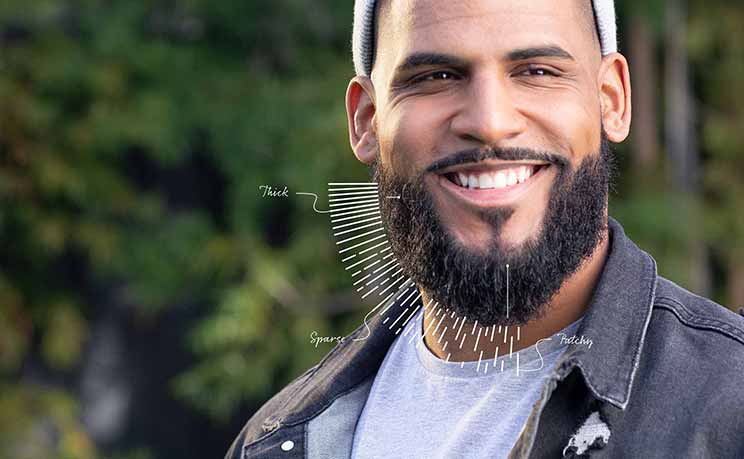AncestryDNA® Traits
Facial Hair Fullness
Did you know males and females have roughly the same number of hair follicles on their faces? What differs is the type of hair. Testosterone makes men's facial hair thicker, leading to beard growth.


Curious about your facial hair? An AncestryDNA® + Traits test can tell you if your DNA suggests you—or the men in your family—may have thicker facial hair.
What Causes Beard Hair?
Babies are all born with hair that is fine and downy. It's known as vellus hair. But when biological males reach puberty, the hormone testosterone causes some of their vellus hair to be replaced by coarser, darker terminal hair.
Since testosterone is what causes facial hair to grow, you might expect a thicker beard to be a sign of higher than average levels of this hormone. But most adult males actually have similar testosterone levels.
In addition to changes like puberty, certain conditions also influence beard thickness. For example, a skin condition like alopecia (that can lead to hair loss) or an iron deficiency like anemia can make your facial hair thinner.
The Genetics of Beard Growth
What determines facial hair growth? It's a combination of genetic and non-genetic factors. Unlike the genetics of head hair, which has been studied extensively, scientists don't yet fully understand the role of DNA in facial hair thickness.
But in general, if your biological father or grandfather had thick beard hair, you're also likely to have a thick beard. And if they struggled to grow a full beard, you may have a patchy beard, too.
Facial hair thickness is what's called an "additive" trait. This means the more "thick" gene variants you inherit from each parent, the more likely you are to have thicker facial hair.
The Science Behind Thin or Thick Beard Hair
Your genes determine how sensitive your hair follicles are to testosterone. If your follicles are more sensitive to this hormone, then you'll have more beard growth.
Scientists have found dozens of genes that play a role in facial hair growth, like the gene LNX1 on the human chromosome 4. Specifically, variations in this gene seem to influence how thickly or sparsely your facial hair grows.
Other genes are likely involved as well. Scientists at Ancestry have found over 500 DNA markers that are linked to facial hair thickness. And as scientists learn more about the genetics of beard growth, they may find even more genetic predictors of facial hair thickness.
Interesting Facts About Beards and Beard Growth
The Guinness World Records entry for longest male beard belongs to Hans Langseth. At his death in 1927, his beard was 17.5 feet long. His family donated the record-setting beard to the Smithsonian after he died.
Feeling inspired? It may take you a while: beard hair grows at an average rate of half an inch per month. But even if you don't set a record, a beard does have the advantage of protecting your face from UV light, blocking 50 to 95 percent of it.
There are many myths about facial hair. One myth for example is that shaving more often will give you thicker beard hair. That's actually not true.
References
Adhikari Kaustubh, Tania Fontanil, et al. “A genome-wide association scan in admixed Latin Americans identifies loci influencing facial and scalp hair features.” Nature Communications. March 1, 2016. https://www.nature.com/articles/ncomms10815.
Caba, Justin. “Beard facts: 6 ways you probably didn't know facial hair influenced your health.” Medical Daily. March 8, 2016. https://www.medicaldaily.com/facial-hair-beard-facts-377119.
Geddes, Linda. “Genetic clues to monobrows and bushy beards revealed.” Nature. January 2016. https://www.nature.com/articles/nature.2016.19483.
Ossola, Alexandra. “The genes behind your weird hair.” Popular Science. March 1, 2016. https://www.popsci.com/genes-behind-your-weird-hair.
Scanlan, Jack. “Ask evolution: Why do men have beards?” SBS. July 25, 2016. https://www.sbs.com.au/topics/science/humans/article/2016/07/25/ask-evolution-why-do-men-have-beards.
Schaefer, Anna. “How to make facial hair grow.” Healthline. February 1, 2023. https://www.healthline.com/health/how-to-make-facial-hair-grow.